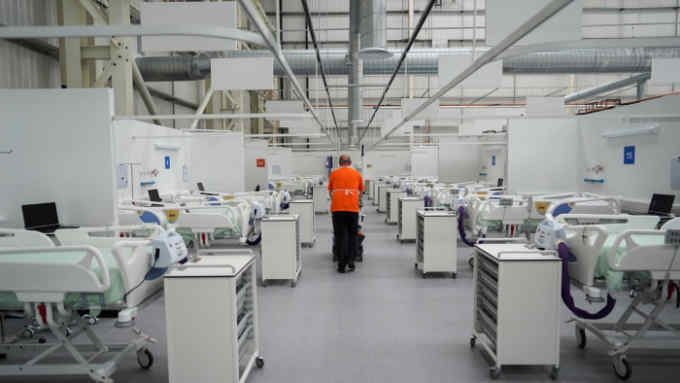Turkey’s logistics providers adjust to the strains of Covid-19

Roula Khalaf, Editor of the FT, selects her favourite stories in this weekly newsletter.
Gokalp Cak confesses that he had never made an online purchase before the coronavirus pandemic struck. But now, the co-founder and vice-president of Netlog, one of Turkey’s largest logistics providers, is just one of millions of people in the country who have flocked to internet shopping.
This shift in Turkish consumer behaviour is creating both headaches and opportunities for companies that transport products from warehouses to customer doorsteps.
“What we’ve seen is there’s a huge problem with courier companies,” says Mr Cak. “No one designs a supply chain to deal with a 200 per cent surge. It’s not something you can ramp up by three times in one day.”
Netlog, which had revenues of close to $1bn in 2019, manages supply chains for producers of food, pharmaceuticals, fashion and lifestyle, and industrial goods.
The company had never previously done home deliveries, focusing instead on business-to-business work. But the sharp fall in international logistics demand caused by Covid-19 — and a flurry of calls from Turkish chief executives desperate for more online delivery capacity — prompted Netlog to change tack.

“Suddenly everyone is your best friend,” Mr Cak laughs. “They are all in crazy ways looking for ways to deliver cargo.”
Now, Netlog is doing 6,000 deliveries a day in Istanbul, Turkey’s largest city. Netlog’s executives are working to establish a new domestic delivery company, with plans for a full nationwide launch in the autumn.
Although there are already several large home delivery operators in Turkey, Mr Cak believes that there will be space in the market for a new player even when Covid-19 subsides.
His clients expect the heightened demand for online shopping to become “the new norm”, he says. “They understand their growth bottleneck is no longer customer demand; it’s delivering the product.”
Online shopping was expanding fast in Turkey even before the pandemic. It grew 35 per cent in the five years to 2019 in terms of the local currency, the lira, according to a report by consultants Deloitte and Turkish informatics industry association Tubisad.
Still, this represented just 6 per cent of total retail sales in Turkey last year — compared with 18 per cent in the UK, 15 per cent in the US, 28 per cent in China and 8 per cent in Brazil.
Tubisad president Kubra Erman Karaca last month labelled the coronavirus outbreak as a “turning point” for ecommerce in Turkey.
Yet the pandemic has not been good news for everyone across Turkey’s logistics sector. The steep fall in demand from international trading partners saw Turkish exports plunge by 41 per cent in April, with a knock-on effect for companies that transport abroad products such as white goods, textiles and cars.
“About 50 per cent of Turkey’s exports go to the EU,” says Kerem Tiryakioglu, co-founder and chief executive of Vektor Mobility, a tech company that offers fleet management services to logistics providers. “Predominantly those are manufacturing-related goods like auto parts,” he adds. Those industries shut down and “there was a drastic reduction in exports.”
Businesses that transport people have also been hit. Garenta, a car hire company, has witnessed a 70 per cent drop in sales at its airport branches and a 50 per cent fall in cities. Garenta chief executive Emre Ayyildiz is looking for ways to capitalise on the change in customer behaviour as people take a more cautious stance towards transport and travel. The company’s car-share subsidiary, Moov by Garenta, has gained 30,000 new members during the pandemic and it plans to expand further.
“We’ve seen public transport usage fall by 85 per cent,” Mr Ayyildiz says. People do not want to use modes of transport that require an employed driver, he adds, so the car-share business model has “come to the fore”.
Arkas, a Turkish shipping, port services and logistics group, has seen greater interest in rail and sea transportation as border closures and quarantine requirements have made deliveries by truck more difficult.
Diane Arcas Gocmez, Arkas executive vice-president, says she hopes that the company’s investments in intermodal logistics hubs — combining rail, sea and land transport — will help Turkey “become a prominent player in the new world of logistics by integrating Turkish commerce with commerce in Europe and Asia”.
That echoes President Recep Tayyip Erdogan’s desire for Turkey to capitalise on a possible shake-up of global supply chains in the wake of the pandemic, as international producers consider reducing reliance on any one supplier. Mr Erdogan and his ministers have stressed that Turkey — straddling Europe and Asia — could be well-placed to benefit from such a shift.
Mr Cak says the Covid-19 crisis has demonstrated Turkey’s resilience. The traffic from Turkey into Europe kept going, he notes: “The supply chain didn’t stop.”
This offers the country “a big opportunity”, whether as an even more prominent force in international logistics or as a supplier of more goods for the European market.

Comments